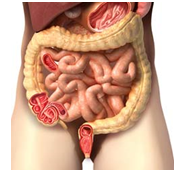Toxic Body, list of some symptoms you may suffer
Avoid a Toxic Bowel – Toxic Body is an important health issue we are discussing this month.
Do you suffer from any of the following?
Bloating, weight problems, bad breath, body odour, brittle hair, nails, circles under your eyes, eczema, cold hands or feet, thyroid problems, digestive problems, abdominal pain, back pain, headaches, poor appetite, lack of energy, weak immune system, occasional constipation?
Tips on how to avoid a Toxic bowel – toxic body
If you have some of the above symptoms it would be a good idea to check your bowel health with a health practitioner.
 The human intestinal tract is 25 to 30 feet in length and covers a surface area the size of a tennis court. The large bowel is about 5-6 feet long. By the age of 40, the average person may have 5-8 kilos of hard, compacted faecal matter lodged in their intestinal tract. Proper cleansing of the impacted faecal material for better digestion and health being.
The human intestinal tract is 25 to 30 feet in length and covers a surface area the size of a tennis court. The large bowel is about 5-6 feet long. By the age of 40, the average person may have 5-8 kilos of hard, compacted faecal matter lodged in their intestinal tract. Proper cleansing of the impacted faecal material for better digestion and health being.
Toxic Bowel – Toxic Body occurs when wastes build up in the colon, toxins are released into the body and absorbed, gradually making the person sick. These wastes must be eliminated. How do we know if our colon is eliminating properly? Many people believe that one bowel movement a day-or even one per week is adequate. For many, constipation is an accepted way of life. But this is not a healthy condition. If your toilet were full, you would flush it right away, not once a day or once a week. Passing a firm, painless stool two to three times a day, is the natural and healthy way.
Even if one eliminates regularly two or three times a day, one can still have a toxic colon. Waste matter can accumulate in the angled or flexed regions of the colon, just as sludge accumulates in the J-shaped joint of the pipe below the sink drain. Accumulated waste matter in colon flexures continuously releases poisons back into the body. Toxic bowel – toxic body can occur when the colon becomes toxic from poor choice of foods.
Let’s face it the Western diet is made up of a lot of processed foods, which are high in preservatives, fats, sugar and low in fibre. Dietary fibre is necessary to maintain a healthy digestive system and bowel movement regularity; therefore this lack of fibre in the diet along with the various additives in our food can subsequently cause poor colon health. It has been claimed that such a diet along with poor colon health care, can lead to the loss of colon functioning in terms of absorbing nutrients and passing stools.
Nutritious, fibre-rich foods have long been associated with regular bowel function and improved digestive health. Recent research suggests that the effects of these foods may be more beneficial than previously thought, especially with regard to the development of colon polyps. Colon, or colorectal, polyps are small fleshy growths inside the lining of the large intestine or rectum. Many types are benign. Others, referred to as pre-malignant, can develop into colorectal cancer. Certain foods promote colon health and may have such a dramatic impact as to even discourage polyp formation.
Your intestinal muscles usually move bacteria along, but if they don’t (due to a medical condition such as diabetes), bacteria multiply and grow. If too much bacteria grow in the small intestine, or if the type of bacteria that grows in the colon is found in the small intestine, problems such as bloating, discomfort, diarrhea and constipation can arise.
Your body’s own bacteria aren’t the only things that can get your digestive system out of balance. Toxins and even parasites can enter your body through diet, respiration and environmental factors.
To avoid toxic bowel-toxic body it is paramount that your bowel is as clean and as healthy as possible for healthy living and disease prevention.
Before knowing how to keep the colon healthy, it is necessary to understand what makes the colon toxic or unhealthy.
Major causes of colon toxicity are:
- Lack of fibre in the diet
- Lack of lactic bacteria
- Fried, processed, over-cooked, devitalized starches, refined sugar, excessive salt and excess saturated fat in the diet
- Chronic anxiety (stress)
- Parasitic /Bacteria infections
For how to address the toxic bowel which a lot of us have but don’t know it contact this health centre on 02 95522777
Sydney Institute of Holistic & Cosmetic Medicine
129 Booth St, Leanna, 2038
Thanks for reading,
From Chris
Chris Tsoutis MD ND DSc DBM DipComplMed DipDerm Cert IV
